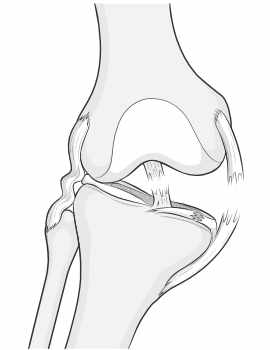The unhappy triad (of O'Donoghue) is the name given to a combination injury of a meniscal tear, medial collateral ligament tear and anterior cruciate ligament tear of the knee.
 Page updated February 2024 by Dr Sheila Strover (Clinical Editor)
Page updated February 2024 by Dr Sheila Strover (Clinical Editor)

Illustration of an 'unhappy triad', 'terrible triad' or 'blowout' - this multiligament injury results in total instability of the knee.
Why is it called the 'unhappy triad'?
The combination of a meniscus tear plus two ligament tears makes this a 'multi-ligament injury', and the knee will be really unstable.
Each one of the injuries is significant in its own right, but the combination of the three together makes this a major injury. It was referred to as an 'unhappy triad' by the surgeon who first documented it, and the name has stuck.
Actually, subsequent to the initial description of this triad in the medical literature, it has been confirmed that it is often the lateral meniscus that is damaged rather than the medial one (which would make it also a posterolateral corner injury).
In either event it is highly unlikely that the knee will regain stability without surgery.
The antero-lateral ligament is usually torn as well as the anterior cruciate and medial collateral ligaments. The significance of this is that this ligament in particular must be repaired if one is to regain full stability after surgery.
-
Quote from peer-reviewed paper:
"....several studies....using arthroscopic equipment, have reported lateral meniscal lesions to predominate by a factor of 2 to 1....The Shelbourne triad of injury to anterior cruciate ligament (ACL), medial collateral and lateral meniscus is a more common combination knee injury than the ‘Terrible Triad of O'Donoghue’ which involved injury to ACL, medial collateral and medial meniscus."
Citation: Dacombe PJ. Shelbourne's update of the O'Donoghue knee triad in a 17-year-old male Rugby player. BMJ Case Rep. 2013 Jan 23;2013:bcr0120125593. doi: 10.1136/bcr.01.2012.5593. PMID: 23349168; PMCID: PMC3597382.
How does one sustain an 'unhappy triad' or 'terrible triad' injury?
This combination of damage to the knee meniscus and ligaments occurring at the same time is usually the result of a high impact sports injury.
The person is usually hit from the side towards the back of the knee in a high speed tackle while the person's weight is being born through that foot. the knee may rapidly swell, and instability will be immediate, with the person unable to walk without support.
What is the early management of an unhappy triad injury?
The knee should be iced (see P.R.I.C.E.) and elevated, and supported in an immobiliser brace until it has been fully assessed. When the swelling is down and the pain diminished, the knee may be taken through a passive range of movement (PROM) routine, but crutches will be needed for walking until after surgery.
Surgical options for unhappy triad injuries
In a patient who already had some bowing of the knee before this accident, the options are simpler.
-
Quote from peer-reviewed paper:
"...patients with the unhappy triad of the knee who have varus alignment in the physical examination could undergo a conservative approach, meaning MCL non-operative treatment and ACL reconstruction surgery. These patients should be observed for complications like patellofemoral subluxation and pain."
Citation: Hoveidaei AH, Sattarpour R, Dadgostar H, Razi S, Razi M. Unhappy triad of the knee: What are the current concepts and opinions? World J Orthop. 2023 May 18;14(5):268-274. doi: 10.5312/wjo.v14.i5.268. PMID: 37304199; PMCID: PMC10251265.
-
Quote from peer-reviewed paper:
"....issues exist which the clinician must consider, including which structures require repair, timing of surgical intervention, and rehabilitation approaches....Management of the patient with injury to both the ACL and the MCL can become complicated and confusing"
Citation: Mangine RE, Minning SJ, Eifert-Mangine M, Colosimo AJ, Donlin M. Management of the Patient with an ACL/MCL Injured Knee. N Am J Sports Phys Ther. 2008 Nov;3(4):204-11. PMID: 21509122; PMCID: PMC2953343.
Forum discussions
- MCL injury
A typical story of how the diagnosis of unhappy ('terrible') triad evolves as the severity of the injury gradually becomes apparent.
- Recent Injury - Help me - I need some peace of mind
Discussion about regaining function after unhappy triad (terrible triad) injury.
Relevant material -
- Medial meniscus tear
- Medial collateral ligament
- Anterior cruciate ligament injury
- Anterolateral ligament
Peer-reviewed paper -
- Journal interpretation - 2015 - Posteromedial Corner of the Knee: The Neglected Corner - by Lundquist et al. and summarised for readers by Dr Sheila Strover (Clinical Editor)
 2018 -
2018 -